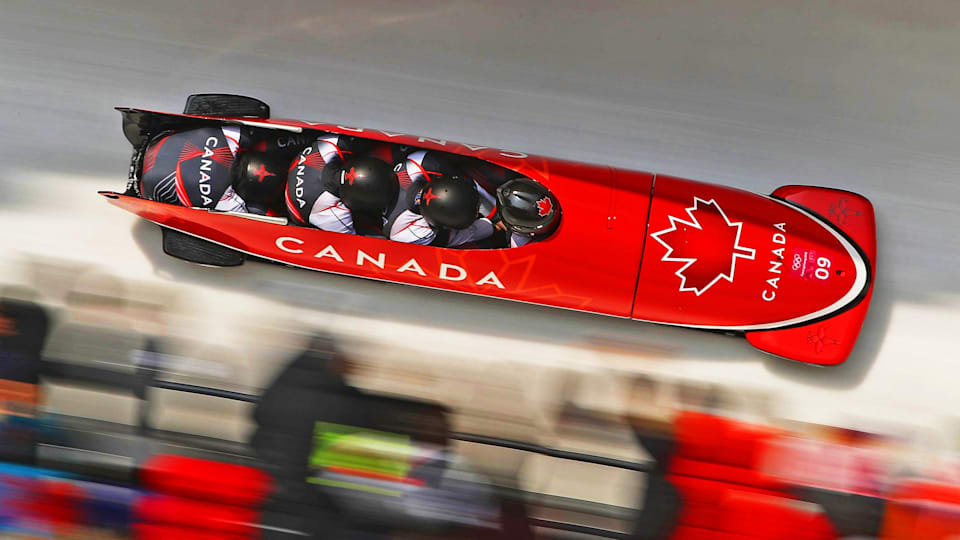
Drawing on what he experienced as a competing athlete, the 32-year-old – who represented Canada in the 4x100m at the Olympic Games London 2012 and in the bobsleigh at the Olympic Winter Games PyeongChang 2018 – hopes to provide practical and actionable solutions to delivering more environmentally sustainable sporting events.
What is the concept for your IOC Young Leaders project?
“There is a dual approach to the project. The first aim is to help both spectators and the organisers of athletics meetings be more environmentally responsible and create less plastic water bottle waste. The second ambition is to reach out to the wider sporting community at all levels, and make people think more inventively about how they can reduce the environmental impact of their events.”
What’s the name of the project?
“I’ve decided to call it ‘Racing to Zero – YYC’. Racing is a nod to athletics, while zero is a reference to the target of zero waste in sport that I want to encourage. The programme will be rolled out in Calgary [Canada], and YYC is the International Air Transport Association code for Calgary International Airport.”
Where did you get the inspiration for “Racing to Zero – YYC”?
“I’ve always been interested in environmental issues and, while I work as an electrical utility project engineer, I also have a MSc in Renewable Energy Technologies. I’ve been involved in sport for 18 years and, with my passion for sustainability, it was an obvious choice to focus on a project with an environmental angle.”
How did you become involved with the IOC Young Leaders Programme?
“I was lucky to attend the Session for Young Participants organised by the International Olympic Academy in Greece in the summer of 2019 because I am Chair of the Athletes’ Commission in Canada. The speakers invited us to come up with ideas for potential projects and I thought – with my athletics career, network of contacts and academic background – a renewable project was the way forward.”
When and where will you implement “Racing to Zero – YYC”?
“The first phase will take place in late spring or early summer in 2020 in Calgary, when the new athletics season starts up. It will be focused on two of the city’s public tracks – the Foothills Athletic Park and Glenmore Athletic Park – and I’m hoping to impact 60,000 athletes and spectators with the message that we can all help minimise the environmental footprint of these events.”
What practical innovations are you planning?
“It’s about both education and implementation. On the ground, I want to provide more recycling bins at both tracks but, beyond that, I hope to be able to afford to build two water fountains, which will be the project’s biggest expenditure. I also want to install temporary fountains, so people can come to the track with a single bottle. In terms of education, I’m aiming to encourage people to use compostable, corn-based bottles to promote sustainability.”
And your plans for the programme beyond athletics?
“The biggest environmental question is how much responsibility we have as individuals for the planet as opposed to governments. I want to encourage a conversation amongst fans and sports organisers about how we can all make a difference. It’s important to remember that plastic bottles are only one element of the challenge. Paper waste is a significant issue, and there is also the transport question and how organisers can help get spectators to events with the least possible environmental impact. It’s about changing our day-to-day behaviour in a sporting context. After the first summer of the programme, I will do an impact assessment report and plan to produce a scaled-up environmental checklist and event plan that can be translated to an end user in any sport.”
Beyond the IOC, what support have you had for the project?
“The Canadian Olympic Committee is fully behind the idea, and I’m also talking to Athletics Canada. I’m hoping to secure additional funding, above and beyond the IOC grant for the project, from private benefactors to make this a truly sustainable social business.”
For the fourth year running, the IOC is grateful for the support of TOP Partner Panasonic, whose generosity has made it possible to further develop the IOC Young Leaders Programme.
Supported by a grant from the IOC of up to CHF 5,000, the new IOC cycle will see over 50 new and ongoing initiatives undertaken worldwide over the next 12 months. The previous 2018-19 cycle delivered 39 life-changing projects globally.
Each new initiative is focused on one of seven core themes – athlete-focused education; the environment; gender equality; healthy living; inclusion (disability) and inclusion (displaced and minority populations); and Olympic values education.